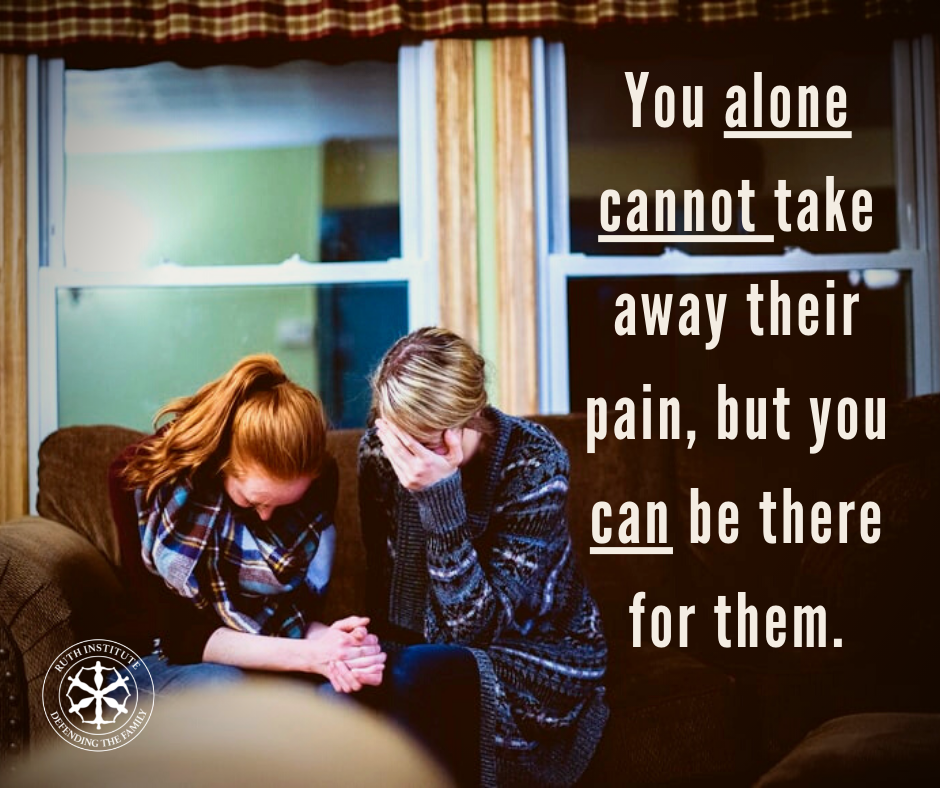This question came in from a reader of my Ask a Survivor column: “What advice would give for someone wanting to support a survivor of sexual abuse (or any kind of trauma)? How can they best support them?”

Dr. Jennifer Roback Morse, president and founder of the Ruth Institute, and I actually covered this topic quite a bit in our recent interview (you can watch the full interview below).
This is such an important question because, even if you don’t realize it, you most likely know someone who has suffered trauma, particularly the trauma of sexual abuse. It could be the person sitting next to you on the bus, someone you work with, or a family member. There are many, many survivors living in silence among us. They need our compassion and support!
The realities of sexual abuse are tough to accept and difficult to understand and so educating ourselves on issues surrounding sexual abuse is important if we are to be a part of the healing process and not a part of the problem. As a society, we need to better address the feelings and responses of survivors.
It’s helpful to keep in mind that no two survivors are exactly alike. Healing isn’t linear and everyone has to find the “tips and tricks” that work for them. Despite the differences in the healing process, there are some things that remain fairly consistent across the board when dealing with survivors.
I have compiled a list of just some of the dos in regard to the things we can all do to help survivors as well as some don’ts we should try to avoid.
Let’s start with some Dos:
–DO Listen without judgment. Sometimes the best thing you can do is listen and be a loving and compassionate shoulder to cry on. You’re not going to be able to fix everything but just being a listening ear can make all the difference for a struggling individual. Remember that you can be a safe place!
–DO Say things like:
“Thank you for coming to me.”
“I believe you.”
“I’m sorry this happened to you.”
“It wasn’t your fault.”
“You did not deserve what happened to you.”
“I’m here for you.”
“I care for you and I want to help you in any ways I can.”
“You are not alone.”
–DO ask how you can help. Ask if there is something in particular the survivor needs. For example, do they need a safe place to stay? Do they need some assistance in finding professional help? So they want to report the crime to police? Do they want you to go with them to the doctor to get checked out? Listen to what he or her is telling you and asking you for and follow through with whatever promises you make.
–DO remind the survivor that they have options and that the decisions are theirs to make (not yours). Some of these decisions might include: going to a doctor to get checked out following an assault, seeking out professional guidance and care from a reputable therapist, going to the police and filing a police report.
–DO your research. Learn about victimization and healing, educate yourself on the grooming process and how predators operate and learn about resources that could help support your loved one.
–DO be there to support the survivor. Check in with him/her to be sure they are doing ok and be sure they are practicing safe behaviors.
–DO gently encourage the survivor to seek out professional help from a reputable psychotherapist. If the survivor is a person of faith, you can help seek out someone who reflects their views.
–DO gently encourage the survivor to speak with a sexual assault detective or police officer. There are many reasons why this may not always be possible and, quite frankly, not all survivors are ready to pursue criminal charges.
–DO encourage good self-care. The last things on a survivor’s mind are usually things such as staying hydrated, eating nutritious foods, taking vitamins, exercising, etc. Trauma affects every part of a person in mind, body, and spirit and taking care of oneself becomes even more important.
–DO practice good self-care for yourself. If you aren’t taking proper care of yourself, you won’t be able to support your loved one as well. You need to be in “peak condition.”
–DO seek out support if you need it. A lot of people think that only the survivor needs to seek our professional help and this isn’t true. His or her support team needs support as well. Whether it be a parent, sibling, spouse, or friend, a survivor’s support person(s) may feel traumatized by what’s happened. Of course the survivor bears the brunt of the pain, but loved ones do suffer as well (although in a different way).
–DO pray. If are a person of faith, pray and invite your faith into the healing process. You can gently invite the survivor to do the same but do not push it. For example, a survivor of clerical abuse might feel triggered by matters concerning religion and faith. However, if incorporating your faith helps you deal with the pain, then by all means do it for yourself! Again, do not push what might work for you on the survivor.

Now onto some Don’ts:
–DON’T say you can’t believe so and so would do such a thing. Come on now! Predators are cunning, manipulative, and are experts in making victims feel shame and guilt (and therefore keep secrets). Again, do your research to better understand predators and victimization. Take for example a case of clerical abuse where the predator priest was popular and well-liked. Maybe you liked him as a priest and felt supported by him in matters of faith. It’s humbling to have to admit that perhaps you judged his character incorrectly but at some point you do have to admit that you, too, fell for his cunning, manipulative ways. Accept it, move on, and do what you can to support the survivor. They are more important than your damaged pride.
–DON’T ask why a survivor went back in cases where the abuse was repeated. The grooming process (the process by which a predator gains trust and control of a victim) is difficult to understand and so (once again) it is necessary to do your research.
–DON’T invalidate their feelings and say things like, “That doesn’t sound like it was that bad” or criticize their healing journey in any way. Just because you might view something as foolish (such as choices a survivor makes in regard to their own healing) does not mean that it is foolish to the survivor. Everyone heals differently!
–DON’T ask what they were wearing or why they were in a particular location. None of that matters. Wrong is wrong and a crime is a crime no matter what. There is zero excuse for victim-blaming. Even if your intent isn’t to harm, it can come across that way to a survivor.
–DON’T ask why they didn’t come to you sooner. I realize I am repeating myself here but do your research on victimization to better understand why victims don’t usually come forward right away.
–DON’T ask for details. Let your loved one come to you if/when they are ready. Do not push for information that he or she is not ready to give.
–DON’T push forgiveness or the idea of “forgive and forget” on the survivor. Just because you think certain actions will make things better or even if you have felt certain things to be helpful in your own life, you might actually make things worse for someone else. In the case of pushing forgiveness, a survivor may feel guilty about not being able to forgive. He or she is feeling enough guilt and shame as it is! They don’t need the added pressure to do something they just aren’t ready to do. The reality is that every individual needs time to process what has happened and then find ways to move forward and heal. Just as with healing, forgiveness does not usually happen overnight!
–DON’T tell him or her to “get over it and move on.” Perhaps ignoring what has happened seems like the easier solution to you but trauma will manifest itself in a variety of different ways later on. Dealing with it as soon as possible is always better in the long run.
–DON’T push anything on the survivor. Just because you think something is a good idea (such as going to the police, going to church, forgiving, or praying) does not mean the survivor is ready or willing to do certain things. He or she needs to feel that they are in control of what happens next (so long as they are practicing safe behaviors). Give them their options and then leave the decisions up to them.

When in doubt, always do your research, speak with a professional, or speak with a survivor or someone who understands what you might be going through. The burden of having to “figure things out” on your end should not fall on the shoulders of the victim. They are dealing with enough already.
The healing process is not something that we can fit into a neat little box. It can actually be quite confusing and messy. Everyone is different and there is no one “right” way for a survivor to respond. The feelings and emotions can be intense and difficult to deal with for a survivor as well as for the people in their support systems as well. If you are a support person, be sure you are taking care of yourself and taking the steps you need to heal as you stay by your loved one’s side while reminding them that there is always hope and that they will get through this. Healing is going to take time, patience, and hard work.
It gets better. I promise! Remember that you alone cannot take away your loved one’s pain, but you can be there for them and love, believe, and support them. You can help to support survivors of sexual abuse and help carry them in their suffering. Sexual abuse is a prevalent evil in this world and causes so much destruction and pain. Supporters of survivors can be instruments of compassion and love and help to create a refuge for those who have been so deeply wounded.


